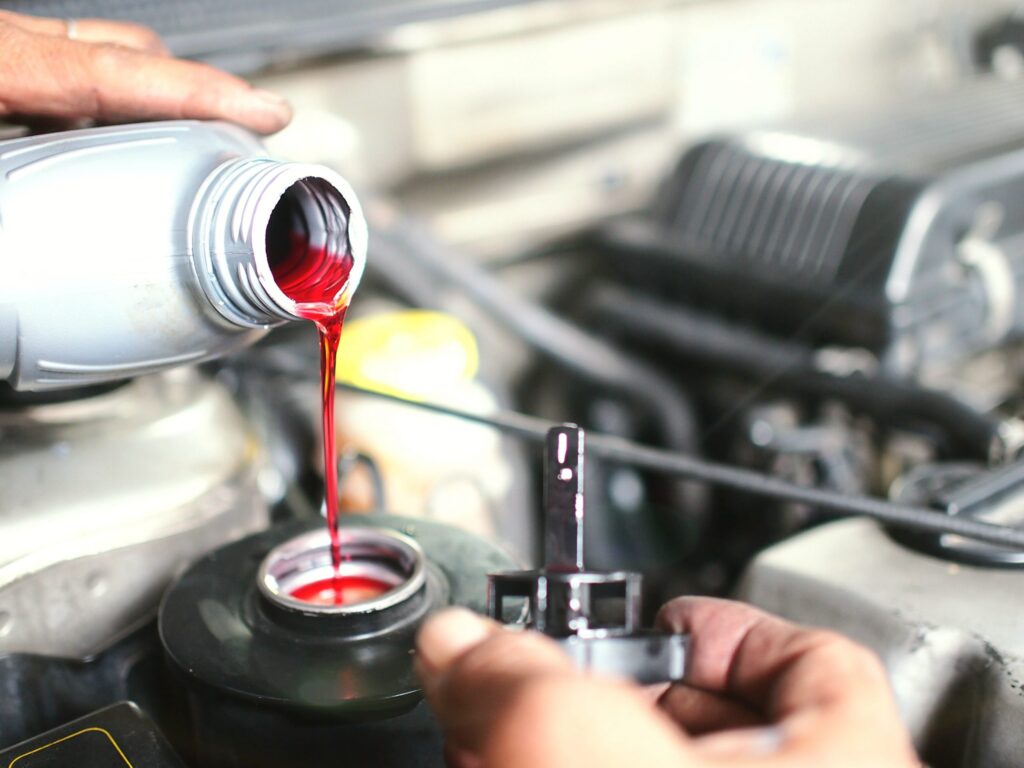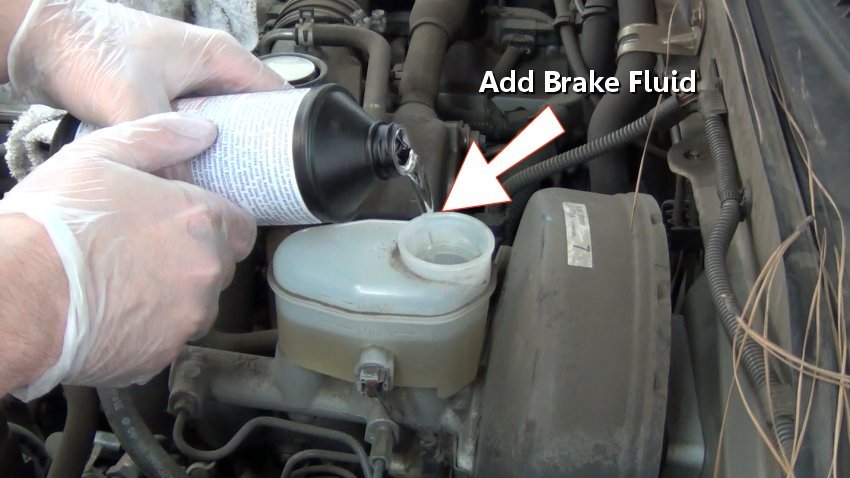The standards upheld by authorities require the brake fluid to be able to withstand the high temperatures generated in the system. Which means it should not evaporate rapidly. On the other hand, the fluid pulls moisture and has alcohol and esters in it. In theory, these two qualities make evaporation a possibility. If the thought has been bothering you, give the following discussion a try to clear things up. Brake fluid is an important part of driving safety. So, it’s best to not leave anything to speculation.
What is Brake Fluid Made of?
Before answering the query ‘does brake fluid evaporate?’, we need to understand what brake fluid is and what its components and quality are. Modern cars use hydraulic braking systems. This system works by amplifying the force of your foot on the brake pedal. The amplified force acts as pressure on the car’s brakes. In this enclosed system, the brake fluid is responsible for transferring and enhancing the force you put on the brake pedal. So, it is easily understandable how vital brake fluid is to your car’s brake system. Therefore, if your car loses brake fluid by any means, your brakes will start to malfunction almost immediately.
Types and Composition
There are mainly three kinds of brake fluid based on composition. These are castor oil-based, glycol-based, and silicon-based. Among these, the castor oil-based fluids are from the old world. Usually, pre-DOT and DOT2 fluids are castor oil-based. Along with castor oil, these fluids consist of alcohol. This might be either butanol (red fluid) or methanol (yellow fluid). Glycol-based brake fluids are the modern DOT 3, 4, 5.1 fluids. They might contain alkyl esters, diethylene glycol, polyethylene glycol, or triethylene glycol. The DOT5 standard brake fluids are mainly silicone-based. They consist of Di-Ethylhexyl sebacate, Dimethylpolysiloxane, and tributyl phosphate.
Quality of Brake Fluids
To qualify for its use in the hydraulic system of your car, brake fluid is required to have certain qualities. These happen to be the right viscosity, a high boiling point, and corrosion resistance. Viscosity refers to the thickness of a fluid and its ability to flow. And brake fluid should have a viscosity that remains unchanged in a variety of situations. In other words, when you use a liquid as your car’s brake fluid, it must have the quality to maintain its thickness and flow under a wide range of circumstances. Another important feature of brake fluid is its high boiling point. A high boiling point ensures that the fluid doesn’t go up in vapors when the friction from the brake pads generates heat. And later on, we will focus on this quality to find an answer to our main query. And lastly, the brake fluid needs to be corrosion resistant. For this purpose, specially formulated additives are added to the fluid. As a result, there is less wear and tear on the brake lines.
How Brake Fluid Works?
Behind the brake pedal is a vacuum booster. When you press on the pedal, the booster enhances the force from your foot, which, in turn, activates the master cylinder. After that, the cylinder pushes pressurized fluid towards the brake lines. So, the harder you step on the pedal, the greater the pressure increase in the brake fluid. From the brake lines, the fluid goes to the drum brakes on each wheel. There, it activates a set of pistons. These pistons work to apply force against a spinning rotor from the brake pads. This results in friction, which eventually slows down and stops the wheel.
Does Brake Fluid Evaporate Overtime?
So, does brake fluid evaporate? Well, there’s no fixed answer. However, some form of answer is extractible from the above discussion. Because we can gather two vital pieces of information that confirm whether the fluid will spontaneously evaporate over time- its ingredients and its overall nature. As far as research goes, there are mixed opinions from all kinds of experts on the renowned car forums regarding this matter.
Some people think it evaporates, and some think it doesn’t. There is equal support for both theories. However, much of the opinion is based on personal observation and doesn’t have any firm grounds. The answer probably has a lot to do with the kind of fluid you are using. Because, as mentioned before, different types of brake fluid have different compositions. Plus, keep in mind that undetectable leaks in your system might make it seem like brake fluid is evaporating.
Has High-Boiling Point
First of all, let’s consider the fact that one of the basic requirements of brake fluid is that it should have a high boiling point. Without this quality, the product wouldn’t be able to pass through authorities like the Federal Motor Vehicle Safety Standards and Department of Transportation. In other words, it will never reach the market. As you may know from science class, a high boiling point essentially means that the liquid doesn’t evaporate easily. So it is easy to see that, generally, brake fluids are not vulnerable to rapid vaporization like spirits or lighter fluid.
Has Alcohol In It
However, we can also gather from the former discussion that the older fluids, like pre-DOT and DOT-2, consist of alcohol. And as alcohol is subject to vaporization at normal environmental temperatures, you might expect similar characteristics in these fluids. But that will only manifest if you lay them out in the open for a long time. Also, consider that there are always fake, cheap, and illegal products on the market. And this is mostly true for underdeveloped countries where there isn’t much authority to supervise the quality of brake fluid. In such scenarios, the fluid might be based on cheap oil or alcohol. And those are the most likely to evaporate spontaneously. Check out the below video explaining why the car loses brake fluid.
When Should You Change Your Brake Fluid?
Usually, most people wonder whether their brake fluid is evaporating, when they see an unexpected performance decrease in their brakes. However, most of the time, it has nothing to do with evaporation. There are other reasons why your brake fluid is not working properly. So, let’s take the discussion further and find the real solution to our initial query. For that, you need to know what makes brake fluid go bad in the first place and if you need to change it.
Reasons For Brake Fluid Going Bad
Brake fluid is hygroscopic. This means it is prone to absorbing moisture from the air. As a result, water will build up in the brake fluid over time. Brake fluid with high water content will drop its boiling point. Therefore, when the brake pedals generate heat, the fluid won’t be able to perform as flawlessly as it did before at the same temperature. You might be wondering how the brake fluid is exposed to moisture in the first place. Because we know that the hydraulic brake system is tightly enclosed. But despite being super sealed, the system can still permit some amount of moisture through the microscopic pores in the rubber pipes. Also, the seals wear down with time, which will allow air into the system. Interestingly enough, when the boiling point drops due to water content, it might sometimes feel like the brake fluid is evaporating. Corrosion in the brake lines is another common reason for brake fluid to evaporate. Although brake fluid contains anti-corrosive particles to maintain the smoothness of the system, they disintegrate over time. As a result, there is corrosion in the metal parts. This ultimately leads to the disruption of the flow of the fluid. You must also read out the article I recently wrote on Does Motor oil go bad.
When To Change Brake Fluid
Driving around with bad brake fluid is very risky. It is needless to say that a faulty brake system can result in a disaster at any moment. Also, if you feel like your brake fluid is evaporating or the system is not working as well as before, be sure to fix it immediately.
If you are not an expert on these matters, it’s best to take the help of professionals. Usually, the brake fluid needs to change according to the owner’s manual of your car. But a professional vehicle expert might also recommend it after evaluating the copper level testing results. Besides testing, some signs will signal the need for brake fluid replacement. Among these, the most common one is the pedal going soft. Or it might feel like the pedal fluid is sinking more to the floor with less resistance. This softness usually means there’s less fluid for the pedal to compress. This is why it demands more force from your foot to maintain adequate pressure. So, whenever you experience a squishy brake, you can safely assume that something’s wrong with the fluid. Also, check for liquid puddles beneath your car. If you notice a collection of fluid under your car that feels somewhat oily to touch, there might be leakage of brake fluid. There are many possible sites of leakage. However, leaking points in the rubber pipe, master cylinder, and calipers are more common. So, check these points immediately and make it a priority to fix them.
Related Topics you must read Does Gasoline Explode Does Gasoline freeze Does Propane go bad Does kerosene go bad Does Oil evaporate
Conclusion
Does brake fluid evaporate– this is a question that crosses many car owners’ minds when their hydraulic systems unexpectedly underperform. But as the above discussion states, it has almost nothing to do with evaporation. Instead, leakage, faulty machinery, or simply crossing an expiry date are often to blame. So, it’s wise to consider these more likely reasons and take action accordingly. Happy learning!!


